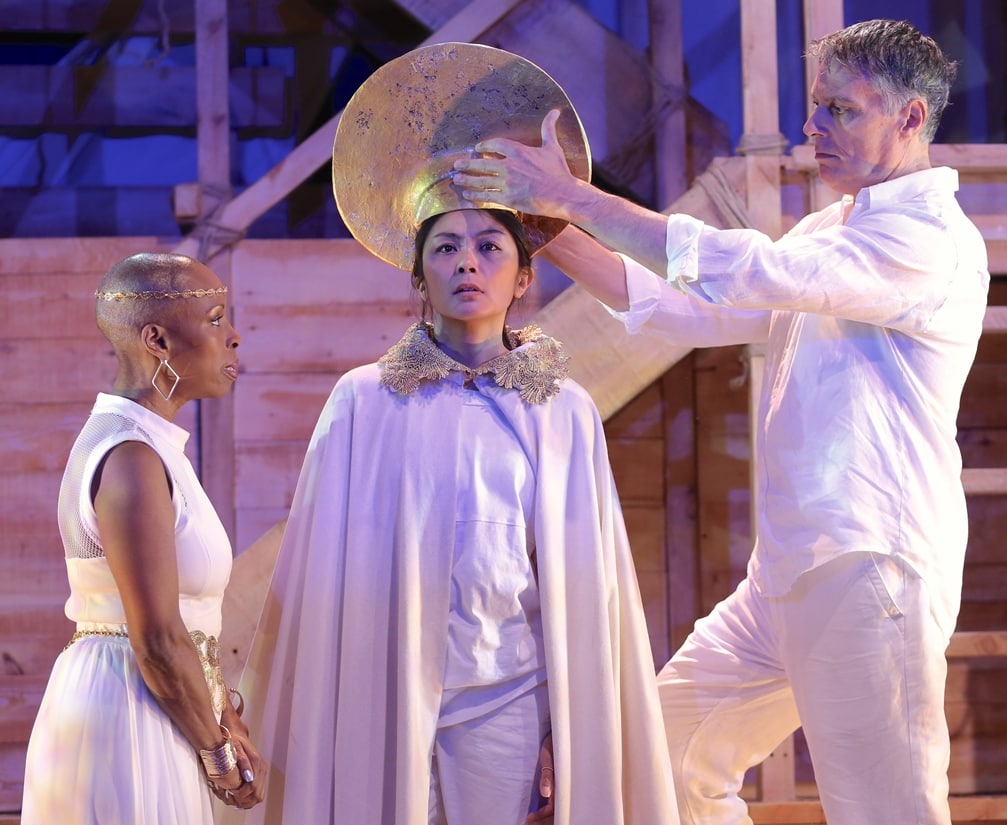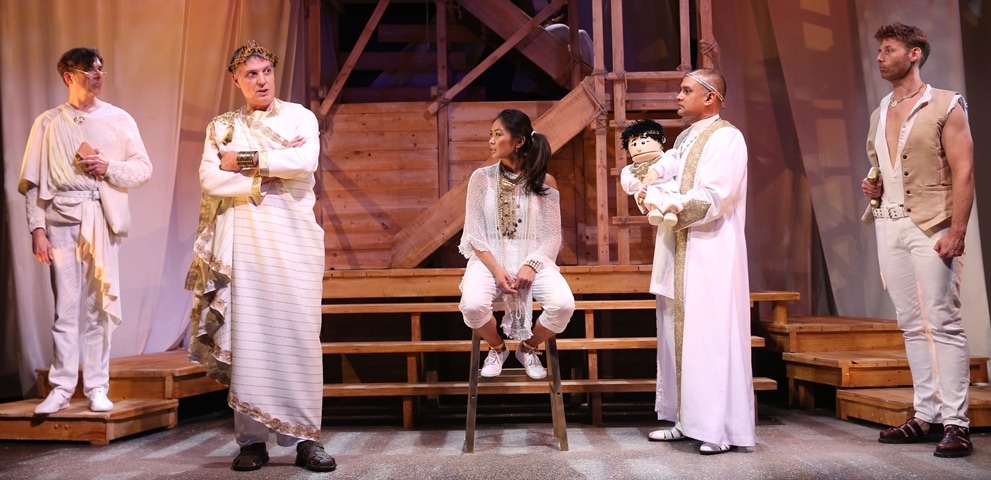The Gingold Theatrical Group honors its mission of presenting works inspired by the socio-political principles espoused by George Bernard Shaw with its new adaptation of the Irish playwright’s rarely produced Caesar & Cleopatra (1898), playing a limited engagement at Theatre Row after a 40-year absence from the stages of New York. Directed by GTG Artistic Director David Staller, the present incarnation of the fictionalized historical comedy, while taking some timely liberties with the script, relies on the original production notes, manuscript, drafts, and letters written by Shaw to ensure that the cautionary theme is told as the author intended it – to offer a warning about the dangers of repeating the violent, destructive, and merciless behavior that has permeated human civilizations from time immemorial, and to ask the universal question, “Where are we? Is it now, or is it then?”

Framed in the context of a dream, the audience is addressed directly by Cleopatra’s long-dead but still strong-willed nurse Ftatateeta, who here serves as the narrator (instead of the Egyptian god Ra – perhaps intended as a nod to modern-day feminism and equality, for which the titular female ruler might be seen as an important prototype) and inquires of us what year it is today. The play continues to move back and forth between her real-time interactions with the audience and the dreamscape of Caesar’s sleep, recounting true and imagined events from the end of the XXXIII Egyptian dynasty, more than 2000 years ago, when the eponymous characters were at the center of cunning sexual politics and calamitous power struggles, both between and within ancient Rome and Egypt. Tracy Christensen’s mostly white and gold costumes, which smartly synthesize our own contemporary dress with references to the courtly attire and accessories of antiquity, augment the time-traveling somnambulist conceit, as does Brian Prather’s simple multi-level set with stairs and platforms constructed in raw wood, to evoke an archaeological excavation site (indicated by posted signs as we enter the theater).
Filled with the progressive and humanitarian maxims Shaw advocated, the play evinces his admiration for the Caesar he portrays, in the clemency he practices and the good governance he promotes. It also characterizes the elder Roman emperor as more of a mentor than a lover to the young Cleopatra (who, in reality, bore their son), teaching her to assume the regal bearing of a confident adult leader (in a theme that anticipates Shaw’s better-known Pygmalion, first presented in 1913) and to renounce the bloodthirsty vengeance he abhors. He is shown to succeed at one, but not the other, as the two ultimately part ways with laugher and smiles, but leave us with foreshadows of their fateful futures.
Robert Cuccioli is ever masterful in the lead role of a thoughtful, wise, and poetic Caesar, who, through age and experience, has learned the importance of compassion and strategizing to keep the peace, or at least, to win the battle at hand. He is compelling in his philosophical ideals and heartfelt calls to make the world a better place, issued with lofty conviction and, at times, outbursts of rage; equally engaging in his playful quips, performed with a sparkle in his eye and a genial look on his face; and fluent in the play’s running joke of his incessant mispronunciations of Ftatateeta’s name. He is also fully believable in his effervescent chemistry with co-star Teresa Avia Lim as Cleopatra, whom he teases and trains, amused by her free-spoken juvenile insults, fascinated by her charm, and angered by her reckless retributions. At first childish and petulant, then increasingly self-possessed and commanding, she matures before our eyes under Caesar’s guidance, from a frivolous outspoken girl to a crafty woman, using her position, beauty, and guile to her own best advantage. And Brenda Braxton’s Ftatateeta leads us through the narrative with her dramatic delivery, expressive movements, and captivating presence – a forceful figure weaving “between darkness and light,” then and now.

The outstanding lead actors are supported by a featured cast that provides assistance and brings conflict to the main characters, along with touches of comic relief. Jonathan Hadley is efficient, dedicated, and dignified as Caesar’s British secretary Britannus, while Jeff Applegate (despite several missed lines at the performance I attended) is, by contrast, more rough and forceful as his Roman officer Rufio (their distinctive demeanors are aptly indicated by their names). Rajesh Bose is impudent and hostile as Caesar and Cleopatra’s chief antagonist Pothinus, the murderous regent of the underage Pharoah Ptolemy XIII (Cleopatra’s brother, husband, and co-ruler, cleverly represented here as Pothinus‘s puppet, which history shows he was). And Dan Domingues gets the laughs as Apollodorus, the over-the-top jingoistic and upbeat “SICILIAN!”
Lighting by Jamie Roderick and sound by Frederick Kennedy effectively punctuate the moods and transport us to the different unseen locales and events, from the cheering and jeering crowds and the splashing waters of the bay to the flickering and flashing illuminations of lanterns, burning fires, and the famed Pharos of Alexandria (one of the Seven Wonders of the World).
GTG’s satisfying adaptation of Shaw’s Caesar & Cleopatra is a rare opportunity to see a classic work that, though infrequently staged, remains as meaningful in our period as it was in the playwright’s time (and in the subjects’ own era), employing wry humor in the service of a momentous admonitory message.
Running Time: Approximately two hours, including an intermission.





